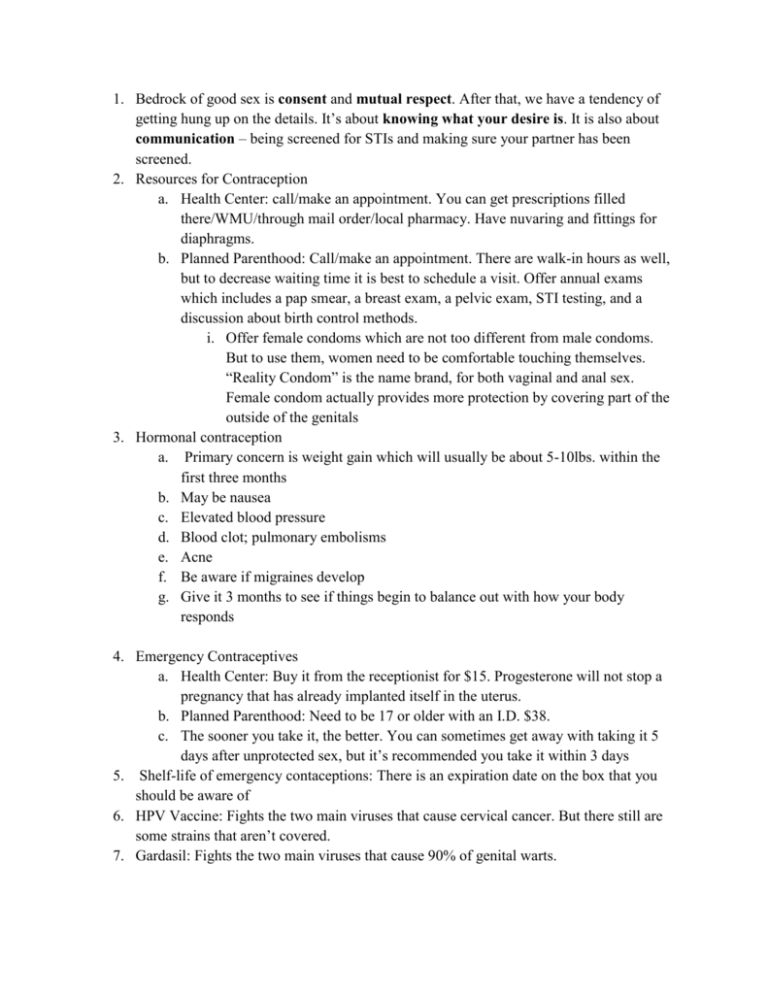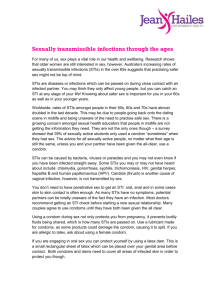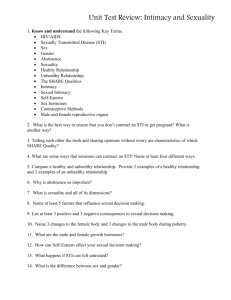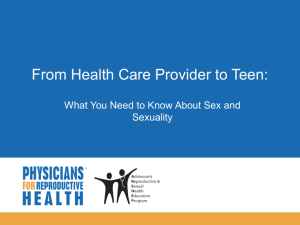
1. Bedrock of good sex is consent and mutual respect. After that, we have a tendency of
getting hung up on the details. It’s about knowing what your desire is. It is also about
communication – being screened for STIs and making sure your partner has been
screened.
2. Resources for Contraception
a. Health Center: call/make an appointment. You can get prescriptions filled
there/WMU/through mail order/local pharmacy. Have nuvaring and fittings for
diaphragms.
b. Planned Parenthood: Call/make an appointment. There are walk-in hours as well,
but to decrease waiting time it is best to schedule a visit. Offer annual exams
which includes a pap smear, a breast exam, a pelvic exam, STI testing, and a
discussion about birth control methods.
i. Offer female condoms which are not too different from male condoms.
But to use them, women need to be comfortable touching themselves.
“Reality Condom” is the name brand, for both vaginal and anal sex.
Female condom actually provides more protection by covering part of the
outside of the genitals
3. Hormonal contraception
a. Primary concern is weight gain which will usually be about 5-10lbs. within the
first three months
b. May be nausea
c. Elevated blood pressure
d. Blood clot; pulmonary embolisms
e. Acne
f. Be aware if migraines develop
g. Give it 3 months to see if things begin to balance out with how your body
responds
4. Emergency Contraceptives
a. Health Center: Buy it from the receptionist for $15. Progesterone will not stop a
pregnancy that has already implanted itself in the uterus.
b. Planned Parenthood: Need to be 17 or older with an I.D. $38.
c. The sooner you take it, the better. You can sometimes get away with taking it 5
days after unprotected sex, but it’s recommended you take it within 3 days
5. Shelf-life of emergency contaceptions: There is an expiration date on the box that you
should be aware of
6. HPV Vaccine: Fights the two main viruses that cause cervical cancer. But there still are
some strains that aren’t covered.
7. Gardasil: Fights the two main viruses that cause 90% of genital warts.
a. Health Center: HPV vaccine is $150; On Wednesdays, you can get genital warts
frozen off
i. You can get it for $30 a shot if you go online and fill out the necessary
forms and receipts.
b. Vaccine is approved for men.
c. Idea is to get it young, before you’re sexually active
d. Possible links to anal cancer
e. Risks of Vaccine: Worst reported symptom is dizziness
f. 2 out of 3 people who have sex with someone who has the HPV virus will
contract it from that person
8. Common STIs on College Campuses
a. Chlamydia is the most prevalent, with growing rates in both Kalamazoo and
Michigan.
i. It can cause internal scarring resulting in infertility
ii. Don’t necessarily show symptoms so you need a test to confirm. A simple
urine test is all that is needed.
iii. African-Americans have a higher rate of Chlamydia and Gonorrhea
b. Herpes is a lifelong disease. Just because you aren’t exhibiting symptoms yet,
doesn’t mean you don’t have it.
i. First episode of herpes is the worst.
ii. Breakouts may reoccur around your period or during exams when you are
stressed and aren’t getting adequate amounts of sleep.
iii. You are most contagious right before you have an actual outbreak
9. STIs in Lesbian Relationships
a. There are no types of STIs that are more prevalent in lesbian relationships.
b. It’s important to still use protection- Free dental dams available in the Health
Center for oral sex. Can also use things like a cut up condom or saran wrap
c. Gloves can help
d. Important to clean all sex toys
i. 1 part bleach, 9 parts water; soap and hot water
e. Need to avoid skin to skin contact if one of you has HPV
10. Common Vaginal Infections
a. Yeast Infection
i. Bacteria grows in moisture, so don’t sit in workout clothes or a wet
bathing suit for long periods of time.
ii. Can take a one-time pill to treat
iii. Can buy a cream to treat (available at the Health Center)
b. However, it could also be Bacterial Vaginosis
i. You must come in to the Health Center or some type of clinic to have it
treated
ii. Medicine may make you nauseous
iii. It is nothing that you can get from/give to a sexual partner
c. Trichinosis
i. A protozoa
ii. You can contract this from/ give to a sexual partner so your partner should
be tested, as well
iii. Need to take an antibiotic
d. UTIs
i. Urinate after intercourse (generally within 20 minutes after)
ii. Drink lots of liquids (like cranberry juice)
11. Gynecological Exams
a. You should get a pap smear at age 21 and every 2 years while you’re in your 20s.
i. Pap smears are when they take the swab and also when they can test for
HPV
b. You should be tested for STIs annually or within 3 months of starting a sexual
relationship with a new partner
c. Breast exams are important; you should be doing your monthly self-exam
12. Spermicide
a. Generally, a good idea to use in addition to condoms and diaphragms and other
barrier methods
b. Some women get infections due to spermicide
c. Spermicide may make the HPV virus attach to rectal tissue more
13. Abortion Methods
a. Can take the medication for up to 9 weeks pregnant
b. Can receive the surgical abortion up to 16 weeks (specific to Planned Parenthood
guidelines). Organizations in Grand Rapids and eastern parts of the state will
perform a surgical abortion up to 24 weeks.
c. At Planned Parenthood, you come in a receive a diagnostic ultrasound and urine
test to conform pregnancy
d. Medication is described as putting your body through a miscarriage. Can be good
if you want to go through it in the comfort of your home with loved ones or by
yourself
e. Surgical Methods
i. Can be put under sedative so you don’t have memories of procedure
ii. In Michigan, there is a 24 hour waiting period between making the
decision to have an abortion and the actual procedure. You are required to
look at certain materials such as images of fetuses at different stages. This
is not required in all states.
14. Answered in 13
15. Sexuality is cultured, gendered, racialized, class-ized, nation-ized, language-ized
a. Differences in what we consider sex as well as who is desirable and who has the
right to desire
16. How to be open with your partner about sexual boundaries:
a. HAVE FUN WITH IT!
b. Make lists of favorite things/things that trigger bad experiences/things you don’t
like/things you might want to try
c. Don’t have these conversations in bed, have them in the library, at a coffee shop,
even among friends
d. You need to know your own sex story even if you haven’t had sex
i. Be at the center of your own questions. Don’t wrap yourself around
someone else’s desires
e. Have the courage to speak up and ensure that you are in a healthy relationship
f. Talk about STIs, talk about history of abuse
g. A person who really wants to be in a relationship with you wants to hear your
story
17. How women reconcile what turns them on (being dominated or being dominant)
a. Sexuality is full of paradoxes
b. Consent is the bottom line
c. Often we learn things about desire through scarring cultural imprints
i. Just because a story is given to you a certain way doesn’t mean you can’t
create your own story
ii. Some people use rape fantasies as a way to let go of shame or work
through memories in a supportive environment
iii. However, some women may not be ready to deal with these memories and
you don’t have to bring every fantasy to life
d. Women need to talk more about their own desires
e. Allow yourself to say what you like, whether that be penetration, oral sex,
whatever it is that brings you pleasure
18. LGBT sex in heterosexist culture
a. It is exciting because you can make it up as you go along because the power isn’t
prescribed to a certain gender.
b. Emergence of transgender is destabilizing traditional notions of gender/sexuality
c. Anything is up for grabs now so it’s exciting!
d. There are gaps between behavior, attraction, and identity. Not everything fits
perfectly together
e. It is interesting to see how individuals navigate their desires and see how this
relates to what they see their gender as
f. It’s important to create comfortable spaces to talk about your ideas of masculinity
and femininity.
19. See 18.
20. Standards of Masculinity in Sex
a. Oral Sex
i. Women may be uncomfortable receiving/giving it
ii. Or a partner won’t perform oral sex or doesn’t even know that the woman
wants it
iii. There is a power dynamic at play with women giving oral sex
iv. Need to be open about it and whether you do or do not want to do it
v. There has been a shift from oral sex being the most intimate sexual
experience to being a precursor to intercourse
21. Discourse about sex on campus
a. Need more discussion and bring in more speakers
b. College is a great time to have these discussions with people you’re comfortable
with
c. Fully embodied sexuality allows you to bring more tools to the table when
seeking social justice
d. Knowing our desires is a social justice project
e. You need to ask yourself: How comfortable do you feel talking about sex and
desires on this campus?
f. If you aren’t comfortable, advocate social justice programs through the Arcus
Center to help change that and get a stronger dialogue started on campus
22. Masturbation
a. It is crucial to know your body
b. Be able to claim the deep center of yourself
c. Teaches you about desire; can change your desire
d. We can’t have healthy sexual lives without knowing what you want
23. Advice about douching: DON’T DOUCHE!
*Thanks to Brittany M. Worthington for taking notes of the Panel's answers!*












